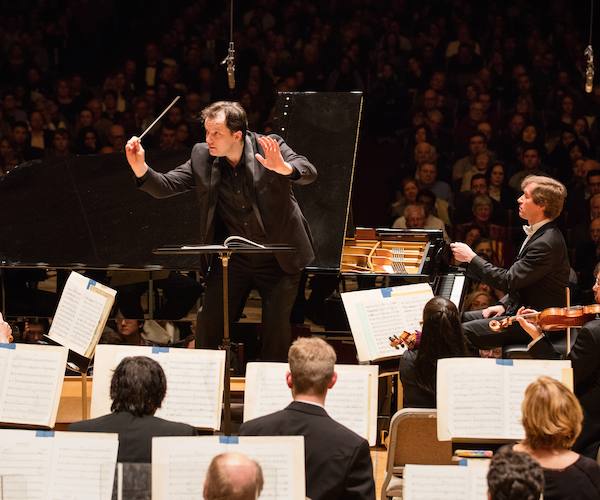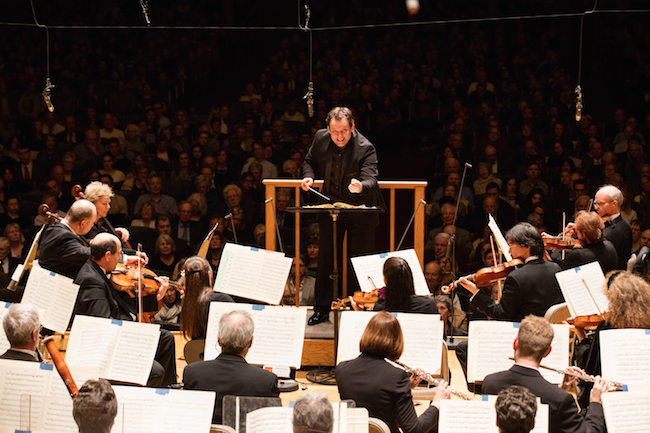Fuse Concert Review: Boston Symphony Orchestra plays Kancheli, Rachmaninoff, and Shostakovich
Saturday’s performance revealed the BSO to be at the top of its collective game, totally locked in, and fully responsive to Andris Nelsons’ leading.

Andris Nelsons and the BSO are joined by Nikolai Lugansky. Photo: Michael Blanchard.
By Jonathan Blumhofer
It’s perhaps little more than an eerie coincidence, but the last two installments of the Boston Symphony Orchestra’s (BSO) Shostakovich series have followed right on the heels of terrorist atrocities in Europe: November’s performances of the Fifth Symphony came within days of the shootings in Paris and this weekend’s concerts occurred in the aftermath of bombings in Belgium. While I remain wary of suggesting that classical music, above all others, offers the most meaningful balm for the worst of human behavior, it was hard to miss the fact that Shostakovich’s Symphony no. 8 – written amid the unfathomable death and destruction of the war in Russia in 1943 – retains a certain timelessness and evokes a depth of feeling that addresses senseless loss and violence in a way unique to the symphonic canon.
At least it did in the harrowing reading Andris Nelsons drew of it from the BSO on Saturday. (Some of this program will be repeated tonight.) This is music that screams as loudly and brutally as any, while offering scenes of desolation and a finale of resigned acceptance that offers no easy answers. The only truth, the music seems to be getting at, is that we’re all in this together, that our very survival and perseverance offers some measure of triumph. It’s somehow nihilistic, comforting, and even a little bit hopeful all at once.
On Saturday, Nelsons did what he does best in this repertoire: he got out of the way and he let the music speak for itself. Interpretively, his Shostakovich performances with the BSO have been unfussy, marked by striking, lucid textures; lustrous instrumental solos; and fearsome intensity. There were moments on Saturday where the reading could have been more forceful – the mechanistic third movement, for instance, might have been driven harder – but, emotionally, Nelsons and the BSO had the temperature of the music throughout the night.
As with the BSO’s reading of the Tenth Symphony last spring, Saturday’s Eighth offered an engrossing account of this Symphony’s sprawling first movement. Unfolding at a rather spacious pace, it balanced the the brawny first theme and shadowy second to striking effect: the former, robust and portentous, the latter, inwardly focused and intense. In this context, the ear-splitting explosions at the movement’s climax seemed the only natural culmination of these oppositional themes.
The middle movements emitted not just sturdy energy but, in the third’s trio section, sardonic humor. Nelsons drew much color from the winds in the fourth movement – the long passage of flutter-tongued figures over its closing pages were boldly realized – while emphasizing Shostakovich’s motivic writing in the finale. The soft closing bars, even if they didn’t provide a satisfying explanation for the freewheeling despair and tragedy that came before, at least afforded a genuine sense of peace.
One may as well cite the BSO’s entire wind and brass sections for the excellence and sensitivity of their playing over the course of the evening, but special mention should be made of Robert Sheena’s numerous, deeply expressive English horn solos. From an ensemble standpoint, Saturday’s performance revealed the BSO to be at the top of its collective game, totally locked in, and fully responsive to Nelsons’ leading. Their recording of this Symphony, set for a summer 2016 release alongside the Fifth and Ninth Symphonies taped earlier this season, promises to be a knockout.
There was less resolution and/or evident purpose to Giya Kancheli’s Dixi, a 2009 score that began the evening and received its American premiere on this weekend’s concerts. Written for chorus and orchestra, Dixi presents a curious amalgam of Latin aphorisms that, in Kancheli’s words, are meant to “remind our contemporaries how relevant…are the age-old problems that have always existed.”
It’s certainly easy enough on the ears. Kancheli’s writing is largely diatonic and a number of recurring gestures unify its materials, making it a relatively straightforward score to follow. The Tanglewood Festival Chorus (TFC), prepared for these concerts by Betsy Burleigh, sang it with plenty of verve and tonal refinement. And Nelsons, always a superb conductor of contemporary fare, led a mighty, colorful performance, drawing out some of the strange instrumental colors – solo accordion and harpsichord, among them – that dot Dixi’s pages.

Andris Nelsons and the BSO perform Shostakovich’s Symphony No. 8. Photo: Michael Blanchard.
But none of that made up for the work’s structural incoherence. Dixi offers no real dramatic trajectory and little by way of musical, emotional, or spiritual pay-off. Rather, on first hearing, it seemed a series of loosely-linked vignettes gradually unfolding but rarely congealing into a meaningful musical whole. Its riffs on Orff, Pärt, Schnittke, John Williams, and others do more to remind how much more interesting and satisfying choral/orchestral music by other composers is than anything else. And, for all its lovely, evocative touches, Dixi’s expressive depths don’t run very deep. That said, Saturday’s audience gave the piece a warm ovation.
More focused and rewarding was Nikolai Lugansky’s reading of Rachmaninoff’s Rhapsody on a Theme of Paganini. Granted, this performance lacked the consistent electricity of Daniil Trifonov’s recent recording of the piece. And it didn’t quite match Stephen Hough’s mercurial 2009 account with Alan Gilbert and the BSO. But, by the time everyone got (more or less) on the same page about a third of the way into it, Lugansky’s Rhapsody really took off.
Lugansky is a pianist with incredible technique and that was on full display throughout his reading. The closing variations, in particular, were stunning for their clarity, precision, energy, and the effortless manner in which Lugansky tossed off their demands. He played the lovely 18th variation beautifully and without too much sentiment. And he brought some nice, varied colors to the numerous iterations of the Dies irae chant that crop up time and again. Saturday’s audience clearly hoped for an encore – they brought Lugansky back for four bows – but he (understandably) took a pass.
The BSO eventually offered an accompaniment to match Lugansky’s playing, though the orchestra sounded a bit ragged over the Rhapsody’s opening minutes. Once it found its footing, though, there wasn’t much in this performance about which to complain. Saturday’s ended about as fine, lively, Romantic a reading of this warhorse as they come.
Jonathan Blumhofer is a composer and violist who has been active in the greater Boston area since 2004. His music has received numerous awards and been performed by various ensembles, including the American Composers Orchestra, Kiev Philharmonic, Camerata Chicago, Xanthos Ensemble, and Juventas New Music Group. Since receiving his doctorate from Boston University in 2010, Jon has taught at Clark University, Worcester Polytechnic Institute, and online for the University of Phoenix, in addition to writing music criticism for the Worcester Telegram & Gazette.
Tagged: Andris Nelsons, Boston Symphony Orchestra, Robert Sheena
